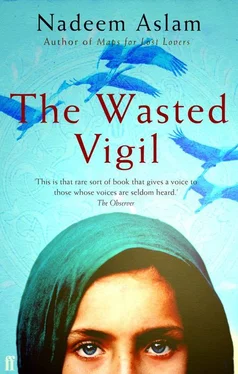Nadeem Aslam - The Wasted Vigil
Здесь есть возможность читать онлайн «Nadeem Aslam - The Wasted Vigil» весь текст электронной книги совершенно бесплатно (целиком полную версию без сокращений). В некоторых случаях можно слушать аудио, скачать через торрент в формате fb2 и присутствует краткое содержание. Год выпуска: 2009, Издательство: Faber and Faber, Жанр: Современная проза, на английском языке. Описание произведения, (предисловие) а так же отзывы посетителей доступны на портале библиотеки ЛибКат.
- Название:The Wasted Vigil
- Автор:
- Издательство:Faber and Faber
- Жанр:
- Год:2009
- ISBN:нет данных
- Рейтинг книги:4 / 5. Голосов: 1
-
Избранное:Добавить в избранное
- Отзывы:
-
Ваша оценка:
- 80
- 1
- 2
- 3
- 4
- 5
The Wasted Vigil: краткое содержание, описание и аннотация
Предлагаем к чтению аннотацию, описание, краткое содержание или предисловие (зависит от того, что написал сам автор книги «The Wasted Vigil»). Если вы не нашли необходимую информацию о книге — напишите в комментариях, мы постараемся отыскать её.
The Wasted Vigil — читать онлайн бесплатно полную книгу (весь текст) целиком
Ниже представлен текст книги, разбитый по страницам. Система сохранения места последней прочитанной страницы, позволяет с удобством читать онлайн бесплатно книгу «The Wasted Vigil», без необходимости каждый раз заново искать на чём Вы остановились. Поставьте закладку, и сможете в любой момент перейти на страницу, на которой закончили чтение.
Интервал:
Закладка:
He tries to see if the stone head can be nudged in any direction. It should be taken away and sold to non-Muslims to finance the jihad against them.
He is relieved Lara wasn’t in the kitchen while he was having breakfast. A woman seen is a Western idea, he had been told by a cleric at a madrassa when he was a child. These dozens of clerics — the emir, the haji, the hafiz, the maulana, the sheikh, the hazrat, the alhaaj, the shah, the mullah, the janab, the janabeaali, the khatib, the molvi, the kari, the kazi, the sahibzada, the mufti, the olama, the huzoor, the aalam, the baba, the syed — had frightened him as they preached when he was very young, moving unpredictably across the full register of the human voice, from the whisper to the growl to the full-throated shout, now screaming, now weeping, now vituperative and righteous, now plaintive and melodious. At the start they would recite a few verses of the Koran to signify that both the speaker and the listener were now in the realm of the sacred, but what followed was, in fact, history — a lament for Islam’s lost glory and power, a once-proud civilisation brought low by the underhandedness of others, yes, but mainly by the loss of faith among the Muslims themselves, the men decadent, the women disobedient. The child Casa was told to supplicate during prayers and beg forgiveness for not loving Muhammad enough, peace be upon him, a man whose sweat was more perfumed than a shipful of roses.
Ay naunehalan-e-Islam, Ay farzandan-e-Tawheed — O children of Islam, O sons of the Sacred Creed …
And so Casa and the other children had wept. By the time he was about twelve he and the other boys at the madrassa hadn’t seen a woman for five years. There was a rumour that a group of older boys had a photograph of a female face, cut up into ten pieces and hidden in diverse corners and recesses. Travelling assorted distances, the fragments came together now and then to form her.
Casa had longed to arrive at the moment when he’d see her — the thought of it was like a butterfly attached to his heart on a string — and when at last he did lay eyes on her he shook at the very phenomenon of her. Unable to find his breath or control his heartbeat, he had lost consciousness. The first thing he remembered upon coming to was that during the Crusades beautiful girls had been sent to seduce and corrupt Salahudin and his generals, the Christian priests assuring the girls forgiveness for all sin incurred in the service of their religion.
He repented. The madrassa teachers had told the children that women’s guile was immense, their mischief noxious, that they were evil and mean-spirited, that all the trials and misfortunes and woes that befell men came from women, that Muhammad, peace be upon him, had said when a woman steps out of the house Satan is delighted. And yet on a bitterly cold night he found himself with a group of others pouring petrol onto a grave and setting it alight, watching the fire leap into the air in a golden dance, their shadows thrown in the shape of a wheel onto the other mounds in the cemetery. The boy in the blazing grave — he had been martyred during a night exercise when, tired and disorientated, his foot had slipped and he had plunged into a canyon — had loved the paper woman’s eyes and, in a moment of now-regretted emotion, his friends had placed one of them in his shroud just before burial. They wanted it back now. The icy earth was solid as metal and difficult to dig through so they were employing fire to thaw it. In the absence of spades and shovels, they used the blade bones of animals slaughtered for food or as instruction. There was little hope of getting another picture because the boys were forbidden from seeing newspapers and magazines from outside the madrassa — ‘Where is the news in any of them to hearten the faithful? Where is the news that a Muslim army has conquered an infidel land?’
By the time he was about ten he had endured every kind of assault on his body by men or stronger boys, and — because the only way to feel any control was to distress or wound others — by the time he was about fourteen he had done the same to younger or weaker boys. At the very core of him was the belief that human beings had little to offer beyond cruelty and danger.
His apparel was often dirty and in tatters but he had learnt that he must not wish to flourish in men’s eyes, only in Allah’s.
The important thing was that he knew a gun could be smuggled onto an aircraft by concealing it in a mixture of epoxy and graphite, that he knew how to defend a house and how to storm it, how to kidnap and assassinate and how to kill with his hands, with his feet.
If you do not fight He will punish you severely and put others in your place, said the Koran. He had been hung by his ankles and electrocuted to see if he would break under torture, his body in spasms for hours afterwards as though the current were still running through him. Testing his resistance, trying to see how deep a breakdown they could provoke, his companions had subjected him to confinement without light, without odour or sound or any fixed reference to time and place. He knew that if captured by Americans he must tell them he was fully aware of his ‘rights’ and ask for a lawyer, tell them that he wanted to be put on trial in a court in New York or London or, best of all, in a European country, just as the youngest warriors knew what they were to tell the Westerners: that they were not ‘war criminals’ but rather ‘war victims’ who had been subjected to ‘undue adult influences’ and ‘indoctrinated’ into firing bullets and throwing grenades. Those between the ages of eight and fourteen were made to learn by heart, along with the Koranic verses, English phrases like ‘the special protections accorded to captured child soldiers’ and ‘the violation of international principles’. They didn’t know what the words meant but that was no barrier to memorising them; they didn’t know what the Koranic verses they chanted day and night meant either, since they were in Arabic. One of the rare entertainments allowed the children was the acting out of a sketch about a holy warrior captured by the Americans, the prisoner’s invoking of those English phrases so frustrating to the captors that they were reduced to banging their fists helplessly on the floor, to much delighted laughter from the audience, the prisoner eventually walking free to continue on the path of armed jihad, having executed the Americans before leaving.
He knew that when a bullet hits a body you hear it, an unmistakable unforgettable sound, and knew HE38 meant the grenade was High Explosive and would burst into thirty-eight fragments. He knew gelignite smelled like the sweetmeats made with almond pulp beaten in cream.
DAVID, before leaving for Jalalabad, goes along the corridor towards Lara’s room. ‘Even to this day’, Zameen had told him at the Street of Storytellers, ‘my dreams take place in that house in Usha.’ She had wanted to bring him here, and after that small place in the Street of Storytellers he wanted to be with her in rooms brightened by rows of windows. Curious about the transformation her face might go through against a different background, in the air of a different temperature. He fastened the small transparent buttons on Bihzad’s shirt, no bigger surely than the lens inside a nightingale’s eye, and wanted him to run and tumble in a large garden. ‘Like legendary heroes he was born in the middle of the night,’ she said, ‘the hour when the wicked sleep.’ Two hours after he was born the night air had filled up with butterflies.
Just about here last night — this wall with its painting of a woman on a horse playing a portable harp — he had decided he couldn’t go in to Lara and had continued towards his own room, overwhelmed suddenly by shame and regret — he must be the last thing on her mind in all this disorder. He also wondered how much of the previous night was just her need to feel safe, a desire for security. Perhaps she was in shock. But then he heard the door open behind him.
Читать дальшеИнтервал:
Закладка:
Похожие книги на «The Wasted Vigil»
Представляем Вашему вниманию похожие книги на «The Wasted Vigil» списком для выбора. Мы отобрали схожую по названию и смыслу литературу в надежде предоставить читателям больше вариантов отыскать новые, интересные, ещё непрочитанные произведения.
Обсуждение, отзывы о книге «The Wasted Vigil» и просто собственные мнения читателей. Оставьте ваши комментарии, напишите, что Вы думаете о произведении, его смысле или главных героях. Укажите что конкретно понравилось, а что нет, и почему Вы так считаете.












